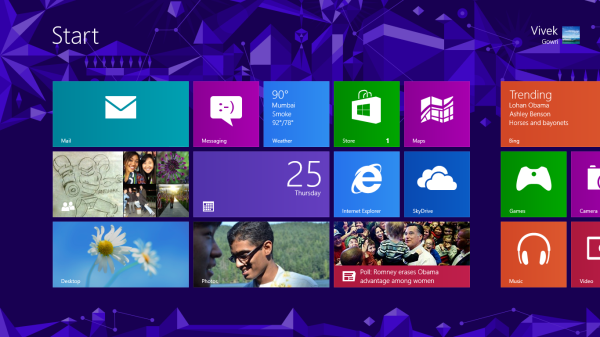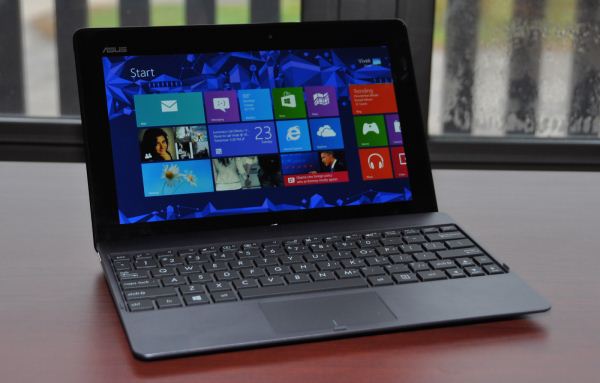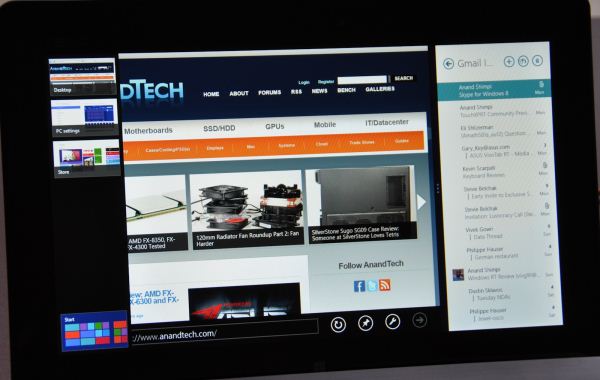The Windows RT Review
by Vivek Gowri & Anand Lal Shimpi on October 25, 2012 12:00 PM EST- Posted in
- Windows RT
- Operating Systems
- Microsoft
- Mobile
- Windows 8
- Tablets
Final Words
So, ten thousand words later, what can we take away from Windows RT? It’s definitely another superb user experience design from Microsoft. Say what you will about Windows Phone 7, but damn if that UI isn’t gorgeous. The Metro design language translates over to the tablet form factor really well, resulting in the Windows Modern UI. We’ve obviously known how Modern UI looks and feels through the various Windows 8 preview builds, but Windows RT ends up being more focused and offering a more consistent experience. It’s a side effect of being limited to apps from the Windows Store - because you spend a significant majority of your time in the new Windows UI, desktop use is minimized. In Windows RT, the Windows Desktop serves the purpose of being the more capable and powerful layer underneath the main portion of the UI, as opposed to Windows 8, which sometimes feels like the new Windows UI existing as an impractical interface layer on top of the traditional desktop.
The dichotomy just feels more comfortable in Windows RT than I feel like it has been in the previous Windows 8 systems that I’ve dealt with. It’s nice. This is the first time I feel like I’ve really connected with the new Windows UI, it makes a ton of sense to me now. I still think for mouse-based navigation, you’re better off treating it as a glorified Start menu, but it’ll be interesting to see how legacy programs affect the use of Modern UI in x86-based Windows 8 tablets as the Windows Store matures.
If you’re really concerned about the state of third-party apps, you just have to wait and see. I’ve seen a lot of snap judgements made about Windows RT in the last couple of days based on the dearth of good applications in Windows Store, and while I agree with that sentiment, I feel like it’s extremely shortsighted to write off the ecosystem already. Neither version of the OS has gone on sale yet, and we know that there are a number of applications that will go live on the official release date, as well as many more coming in the weeks ahead.
This isn’t like Windows Phone, where we need to see whether the platform will get any market traction before predicting the growth of the app marketplace. You can basically assume that the marketplace will expand significantly unless somehow everyone stops buying Windows-based systems on October 26th. The odds of that situation arising seem relatively low, so my bet is that the strength of the ecosystem will be a non-issue a month from now.
The default inclusion of Office 2013 and the emphasis on physical keyboards makes Windows RT the first tablet platform to significantly address the question of productivity. Combined with the equally advanced task switching and multitasking built into the UI, and this becomes the first legitimately useful tablet operating system out there. The Galaxy Note 10.1 wasn’t bad, but it was a single device that built additional functionality into a custom Android skin. Every single Windows RT slate comes out of the box with Office and the ability to have multiple active application windows. It’s just a few steps ahead of competing tablet platforms at this point.
And it’s not like RT loses out on a content consumption front. It’s paired with what is a very strong entertainment store and gaming franchise in Xbox Live, and the browsing experience is definitely competitive. It’s also a competent e-reader, with Amazon’s Kindle being one of the headlining apps currently in Windows Store. It even matches the power efficiency of the other ARM-based tablets, with competitive battery life and standby time. Obviously, ARM is the driving factor in the low power consumption, but it’s good to see that Windows is on a similar level as iOS and Android.
So this is a tablet platform that can do a good job of replacing both an iPad and an ultraportable in a number of different workflows. You get the best of both worlds, in some sense - Windows RT tablets have similar form factors to the iPad and leading Android tablets, and offer near-equal battery life, performance, and user experience, but they also give you the added benefit of strong productivity applications and the power of Windows Desktop. From a conceptual standpoint, almost anything you can do with an iPad can be done equally well (or close) on a Windows RT tablet, but the desktop-caliber office suite and versatile multitasking interface of Windows RT are impossible experiences to replicate on the iPad. It's not a perfect operating system by any means, but it brings a new dimension to the tablet space. So if you’re looking for a new tablet this fall, Windows RT deserves your consideration.













233 Comments
View All Comments
khanikun - Friday, October 26, 2012 - link
Think you hang out with a lot of kids, cause everyone I know doesn't promote games. They promote useful apps. Cardstar, vehicle traffic apps, gas prices around you apps, etc. Well, at least what I saw in the DC/Baltimore area.Maybe in middle-of-nowhere, where there is barely any traffic, 1 supermarket, 3 gas stations, they don't need such apps and just play games.
dysonlu - Friday, October 26, 2012 - link
Well, I guess you hang out with middle age people who drive gas guzzlers and trucks then. See what I did there, dick?Just take a look at the Apple App Store charts, mostly games and entertainment apps rule. Do some reading. It's not just coincidence that Angry Birds, Fruit Ninja, etc., became household names.
Oh and try to argue without insulting or degrading others. You may not be a kid but you should grow up.
designerfx - Thursday, October 25, 2012 - link
yeah this was never true, even for android and ios. it was a rumor started by....wait for it, wait for it..............Microsoft.
NeuroticNomad - Monday, October 29, 2012 - link
You ARE aware that Apple stopped accepting fart apps back in September of 2010... over 2 years (and 500,000 apps later), are you not?App Store count at the end of Aug 2010: Just under 250,000
Source: http://tech.fortune.cnn.com/2010/08/28/apple-app-s...
App Store count September 2010: 703,189
Source: http://148apps.biz/app-store-metrics/
Fart App Ban: September 2010
Source: http://www.engadget.com/2010/09/09/apples-app-stor...
NeuroticNomad - Monday, October 29, 2012 - link
Second link is for 2012, not 2010.appliance5000 - Thursday, November 1, 2012 - link
I find that disappointing.cappasay - Thursday, October 25, 2012 - link
Yesterday the latest report said 7k apps. I can't attest to their quality.. but your statement about taking "at least a year" for "tens of thousands of apps" seems a bit off.p05esto - Thursday, October 25, 2012 - link
How many stupid apps do you actualyl use? I installed about 20 apps when I first got my tablet and have hardly installed anything else. I surf the web mostly, check a little email and play checkers....that's about it!tbutler - Thursday, October 25, 2012 - link
I also think the review is being overly optimistic about Metro apps.The argument is that Windows 8 will have a huge install base, therefore developers will write Metro apps for Windows 8. But the review itself admits "for mouse-based navigation, you’re better off treating it as a glorified Start menu", and indeed the 'traditionalist' reply to Win8 critics seems to be "other than the Start screen, you can ignore Metro and just use it like you used Win7." If this is the way people are going to use it, the installed base argument is worthless; all those supposed millions of Windows 8 users are going to be in desktop mode, so there's no incentive to write Metro apps for them.
Metro app development is going to have to rise or fall on the strength of the tablet market, which is a much iffier prospect.
a5cent - Thursday, October 25, 2012 - link
I expect to see the market split between power users / IT workers and consumers.Professionals requiring the heavyweight software packages (MatLab, Maya, Photoshop, etc) will probably stick with the view that the start screen is nothing but a glorified app launcher.
After an adaptation period however, consumers will find themselves using Metro more and more often and at some point, desktop mode will become irrelevant for many, including those with laptop and desktop PC's. So I do think notebook/desktop sales will help strengthen the market for Metro app developers.